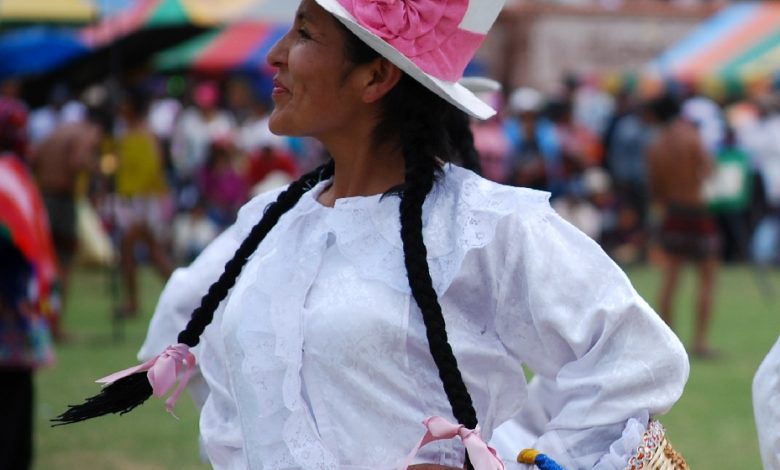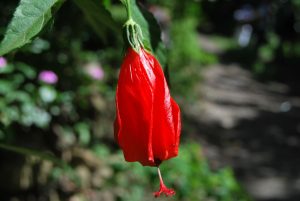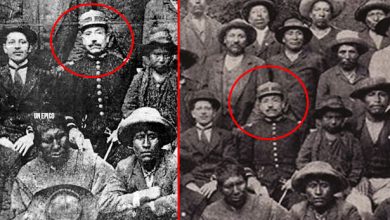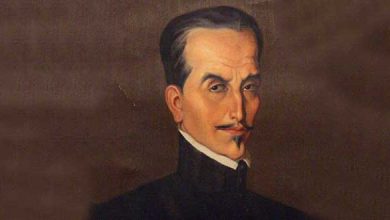Nieto’s Romance of the Cholo Sampableño

Luís Nieto Miranda, the poet of Cuzco, finds scenes filled with meaning although on the edges of what other people might think significant. In this poem, he describes a couple on the way to and from a regional, weekly market. They walk and the life of the poem is that walk, their engagement with the landscape and the way nature observes them.
Nieto uses a word to describe the couple, Cholo, that is very common in Peru and immediately understood. However there is no easy equivalent in English. A Cholo is an ordinary working class person from a town or city, generally of indigenous origin.
While much has changed since Nieto wrote, including the ordinary daily dress that marked Cholos as a distinctive population, nonetheless much is the same, including going to market. People walk often, although they may also ride bicycles or wait for buses. Still much of the feeling Nieto captures of the eroticism of a couple on their way to and from a market stays the same.
Nieto also describes the songs the Cholo Sampableño sings as waynos, a classic song-style that has its origins in Peruvian antiquity, but which is typical of the Cholo as a social strata. Waynos, to use his spelling, are still listened to, although now on MP3 players or even iPods, as well as sung. A simple look at youtube for the ordinary music of Cuzco and its provinces will show you how strong this style still is.
Like so much of contemporary music, these are generally songs of love and its frustration.

In the translation, instead of wayno, I just used the word “song” to capture what in today’s Peru they would call “temas” or themes. The comparable tunes seemed too much of the moment and wayno seemed to overburden the text with local particularity.
Nieto chose to focus his poem on the process of going, rather than on the arrival. While this is an artistic choice, it also expresses something Andean since the people of the Andes focus on process and movement.
Nieto also introduces something else tellingly Andean in his poem which does not easily fit into Western aesthetics. He notes nature as interacting with the couple as well as a source of metaphors for them. Nature, in its various manifestations, is sometimes background, sometimes object, and sometimes foregrounded witness. The couple is most definitely not moving through empty space as they go from town to market, but rather a space full of life that despite their intense focus on each other they interact with and it with them.

Romance of the Cholo Sampableño
Down a road of laughter
with his girl and his charango
to Sicuani’s weekly market
goes the Cholo from San Pablo.
He wears a silver ring
his hands are like olives.
His eyes black and clear
sing to him like birds.
Shoes like those that bite,
he bought for six soles.
His pants fly at half mast
and his underwear is striped.
How proud he must feel
with his well worn poncho.
(The Cholo’s going to the fair
to get drunk on songs).

How fresh is Margacha
now that she has washed.
She wears a Sunday dress
and on her back a bundle.
She wears her three rings
and a lovely white hat
thigh high boots and
well starched lingerie.
The Chola’s laughter
shines on every tree
while by the road
slumbering lie the hills.
While walking near a garden
they picked some juicy peaches.
The birds from their seats
perched watching them.
Before arriving in town
dogs barked at them.
Margacha’s full breasts
shook with surprise.
The fair is in Sicuani
and they are from San Pablo.
The Chola walks happily
The Cholo sings his songs.

As the day goes on
and the sun turns red,
Fermín and his Margacha
return home to San Pablo.
On the way, in the stretch
of road unsteady,
the Cholo breaks out
in laughter and song.
(It is five in the afternoon
and they still have booze).
Fermin really wants
to get to the empty zone.
His heart in his chest
gallops with romance.
Margacha turns him on
so he pinches her arm.
From flirt to flirt
the night hung up its shawl.
(The Cholos are fired up
and still far from San Pablo).

By The side of the path
broke out an anguished cry.
The silence and the sobs
have become two thousand shards.
In the oven of their kisses
the night is burning up
and two sneaky stars
pretend not to have seen.
Among all the wheat-fields
which continue to shiver
you can hear much laughter
and a shameless charango.




